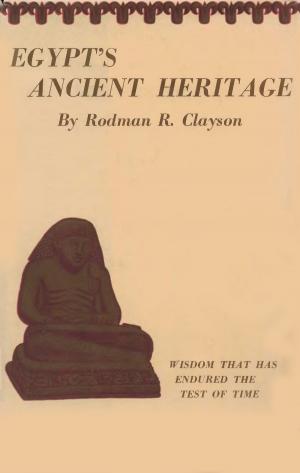| Author: | Thomas B. Sheridan | ISBN: | 9780990693949 |
| Publisher: | New Academia Publishing | Publication: | December 15, 2014 |
| Imprint: | New Academia Publishing | Language: | English |
| Author: | Thomas B. Sheridan |
| ISBN: | 9780990693949 |
| Publisher: | New Academia Publishing |
| Publication: | December 15, 2014 |
| Imprint: | New Academia Publishing |
| Language: | English |
This is a study of the concept of God, not from the perspective of any religious tradition, but rather as belief in a supernatural entity as has prevailed through the ages. The book's unique perspective is to ask what can be modeled in denotative language (much as modeling in science, medicine and modern professions) in contrast to connotative language (e.g., myth, metaphor, art and music). It adopts the assumption of model-based reality, as currently prevalent in physics and some branches of philosophy. That criterion means an entity can be called real for public discourse purposes only to the extent that a credible model can be made of what the entity is or how it works (as contrasted to the private reality of thoughts, perceptions or dreams.)
"It is rare to see the ultimate question of God as prime mover examined as a problem open to rigorous scientific inquiry. Thomas Sheridan has now done it with admirable clarity."
—Edward O. Wilson, Pellegrino University Research Professor Emeritus, Harvard University, Two-time Pulitzer Prize winner, and author of the The Meaning of Human Existence (2014).
"Sheridan's argument supporting atheism is different and unique. It is a scholarly, scientific argument, rather than an emotional one. It should be included in every library collection focused on human belief systems."
—David G. Gil, Professor Emeritus of Social Policy, Brandeis University.
"The book is well written, well-organized, comprehensive, informative, and unique. I am not aware of similar books in the literature."
—Victor Stenger, Author of God, the Failed Hypothesis, Professor Emeritus of Physics, University of Hawaii and Visiting Fellow in Philosophy, University of Colorado.
"A novel addition to what one might call 'quantitative theology', raising some interesting ideas about the relation of science to religion. It also provides a concise summary of the history of religion and ideas, and an excellent summary both of scientific method and scientific modeling. The latter alone makes the book worth buying."
—Neville Moray, Professor Emeritus of Applied Cognitive Psychology, University of Surrey, UK.
"It is rare to see the ultimate question of God as prime mover examined as a problem open to rigorous scientific inquiry. Thomas Sheridan has now done it with admirable clarity."
—Edward O. Wilson, Pellegrino University Research Professor Emeritus, Harvard University, Two-time Pulitzer Prize winner, and author of the The Meaning of Human Existence (2014).
"Sheridan's argument supporting atheism is different and unique. It is a scholarly, scientific argument, rather than an emotional one. It should be included in every library collection focused on human belief systems."
—David G. Gil, Professor Emeritus of Social Policy, Brandeis University.
"The book is well written, well-organized, comprehensive, informative, and unique. I am not aware of similar books in the literature."
—Victor Stenger, Author of God, the Failed Hypothesis, Professor Emeritus of Physics, University of Hawaii and Visiting Fellow in Philosophy, University of Colorado.
"A novel addition to what one might call 'quantitative theology', raising some interesting ideas about the relation of science to religion. It also provides a concise summary of the history of religion and ideas, and an excellent summary both of scientific method and scientific modeling. The latter alone makes the book worth buying."
—Neville Moray, Professor Emeritus of Applied Cognitive Psychology, University of Surrey, UK.
This is a study of the concept of God, not from the perspective of any religious tradition, but rather as belief in a supernatural entity as has prevailed through the ages. The book's unique perspective is to ask what can be modeled in denotative language (much as modeling in science, medicine and modern professions) in contrast to connotative language (e.g., myth, metaphor, art and music). It adopts the assumption of model-based reality, as currently prevalent in physics and some branches of philosophy. That criterion means an entity can be called real for public discourse purposes only to the extent that a credible model can be made of what the entity is or how it works (as contrasted to the private reality of thoughts, perceptions or dreams.)
"It is rare to see the ultimate question of God as prime mover examined as a problem open to rigorous scientific inquiry. Thomas Sheridan has now done it with admirable clarity."
—Edward O. Wilson, Pellegrino University Research Professor Emeritus, Harvard University, Two-time Pulitzer Prize winner, and author of the The Meaning of Human Existence (2014).
"Sheridan's argument supporting atheism is different and unique. It is a scholarly, scientific argument, rather than an emotional one. It should be included in every library collection focused on human belief systems."
—David G. Gil, Professor Emeritus of Social Policy, Brandeis University.
"The book is well written, well-organized, comprehensive, informative, and unique. I am not aware of similar books in the literature."
—Victor Stenger, Author of God, the Failed Hypothesis, Professor Emeritus of Physics, University of Hawaii and Visiting Fellow in Philosophy, University of Colorado.
"A novel addition to what one might call 'quantitative theology', raising some interesting ideas about the relation of science to religion. It also provides a concise summary of the history of religion and ideas, and an excellent summary both of scientific method and scientific modeling. The latter alone makes the book worth buying."
—Neville Moray, Professor Emeritus of Applied Cognitive Psychology, University of Surrey, UK.
"It is rare to see the ultimate question of God as prime mover examined as a problem open to rigorous scientific inquiry. Thomas Sheridan has now done it with admirable clarity."
—Edward O. Wilson, Pellegrino University Research Professor Emeritus, Harvard University, Two-time Pulitzer Prize winner, and author of the The Meaning of Human Existence (2014).
"Sheridan's argument supporting atheism is different and unique. It is a scholarly, scientific argument, rather than an emotional one. It should be included in every library collection focused on human belief systems."
—David G. Gil, Professor Emeritus of Social Policy, Brandeis University.
"The book is well written, well-organized, comprehensive, informative, and unique. I am not aware of similar books in the literature."
—Victor Stenger, Author of God, the Failed Hypothesis, Professor Emeritus of Physics, University of Hawaii and Visiting Fellow in Philosophy, University of Colorado.
"A novel addition to what one might call 'quantitative theology', raising some interesting ideas about the relation of science to religion. It also provides a concise summary of the history of religion and ideas, and an excellent summary both of scientific method and scientific modeling. The latter alone makes the book worth buying."
—Neville Moray, Professor Emeritus of Applied Cognitive Psychology, University of Surrey, UK.















